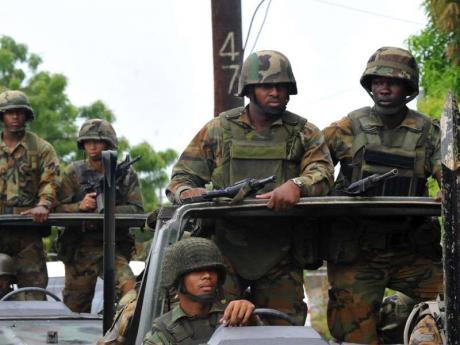Jamaicans still want army patrols
THE NUMBER of Jamaicans who would want to see the army called out more often to assist in the fight against crime has decreased when compared with last year, the latest Gleaner-commissioned Bill Johnson poll has found.
Despite the reduction, the thirst for the Jamaica Defence Force (JDF) remains high, towering at 74 per cent. Last year, 87 per cent of Jamaicans told Johnson they would want to see the army called out more to help fight crime.
The most recent survey was conducted among 1,008 persons across Jamaica's 14 parishes on May 28 and 29, and June 4 and 5, 2011. It has a margin of error of plus or minus four per cent.
Only 10 per cent of those persons surveyed last year were opposed to the army being called out, but in the recent poll, the number rose to 23 per cent.
The last time the army was called out for a full-scale anti-crime operation was in May 2010 when a battalion was sent into Tivoli Gardens and other sections of west Kingston to capture then fugitive, Christopher 'Dudus' Coke.
On that occasion, thugs reportedly engaged the lawmen in a gunfight which left more than 70 persons, including one soldier, dead.
The soldiers operated then under a state of public emergency and were also responsible for the death of businessman Keith Clarke, who was shot 22 times at his East Kirkland Heights, St Andrew, home.
Lack of trust in the JCF
Since then, the JDF has been involved in assisting the police in several curfews and other operations.
Many analysts have pointed to a lack of trust in the Jamaica Constabulary Force (JCF) as the reason for Jamaicans' consistent call for the army to be put on the streets.
But data gathered by Johnson suggest a slight reduction in the number of Jamaicans who are of the view that the police force is corrupt. The survey found that nationally, 59 per cent of the population - down from 63 per cent last year - views the force as being corrupt.
While the figure represents a slight decline, it is within the margin of error of the poll.
At the local level, the survey found that 30 per cent of respondents, down from 31 last year, view police personnel in their area as corrupt.
Meanwhile, the majority of Jamaicans said no when asked whether they supported the view that all members of the police force should be fired, followed by a process of rehiring, where only people who passed strict lie-detector tests would be employed as cops.
Fifty-six per cent of those sampled, up from 52 per cent last year, said they would disagree with such a move, while an unchanged 39 per cent, when compared with last year, agreed with the proposal.
Police Commissioner Owen Ellington has said a serious anti-corruption strategy could lead to the force being cleaned up in five years.
"I have said to all commanders, and it's by way of instruction, that people who have a record of indiscipline, dereliction of duty, disrespect to any individual, whether it's to police or civilian, when they come up for re-enlistment, let us do a comprehensive review.
"If we take this seriously, if it works, in five years' time, we can cleanse this police force," Ellington told the Police Federation's annual conference last year.
Data provided by the anti-corruption branch of the JCF show that between January and May this year, 40 persons were prevented from re-enlisting as members of the JCF, while 18 others were dismissed for corruption. Of the 159 police personnel subjected to polygraph testing this year, seven of them failed.

